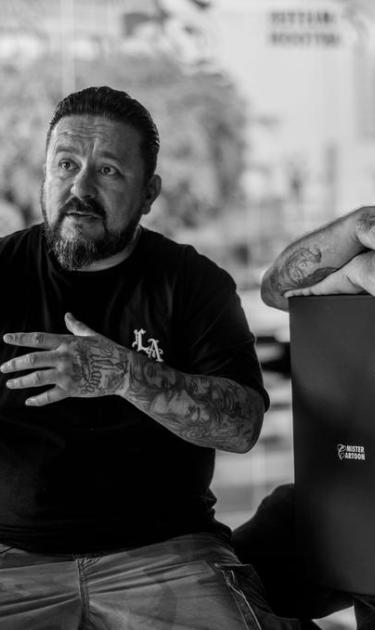There’s a montage midway through Estevan Oriol’s documentary LA Originals that feels like a snapshot of the early 2000s. In it you see the likes of Beyoncé, Justin Timberlake, 50 Cent, Eminem, Christina Aguilera, Nas and Method all gleefully getting their tattoos done by Oriol’s longtime friend and colleague, Mark Machado aka Mister Cartoon. The star-studded montage is a reminder of how far the two Mexican American artists had come and how influential they’d come to be not just in the hip-hop scene but in the mainstream culture at large.
Telling their twinned stories roughly from their beginnings in Los Angeles and chronicling their rise to becoming tastemakers that made Chicano street art a global sensation, Oriol’s intimate documentary boasts a stellar lineup of talking heads. Snoop Dogg happily tells viewers that “If you ain’t got tatted by Cartoon, you ain’t got no tat” while everyone from Eminem, George Lopez, Michelle Rodriguez, Wilmer Valderrama and even Kobe Bryant sing the praises of the two Los Angeles-based artists.
Oriol may be best known today for his photography, having captured the west coast hip-hop scene at its height, but his use of archival footage in LA Originals further establishes him as a historian of Los Angeles. To watch him recount the way he went from managing tours for Cypress Hill to designing album covers for Snoop Dogg and directing music videos for Blink 182 — not to mention taking iconic pictures of celebrities that have graced magazine covers all over the world — is to see him tell a story of an LA that rarely gets the spotlight. For while there are big names all over the doc helping cement both Oriol and Mister Cartoon as pioneers in their own right, there is just as much an interest in the gritty world of skid row (of gangs and addicts, homeless and vagrants) that didn’t just play backdrop but was central to both of their stories.
So, while LA Originals is an origin story of sorts of Oriol’s artistic partnership with Mister Cartoon, it is also a chronicle of how Los Angeles street culture remains pivotal to their work. Even as he shoots modern-day LA, with its gentrified buildings and a newly-revamped downtown scene, Oriol’s archival footage of those same blocks suggest there’s a history that refuses to be erased. His on-camera interviews with former addicts and homeless staples of skid row puts on screen the very compassion both Oriol and Mister Cartoon have brought to bear on the oft-ignored communities that first gave rise to their own art. “That violence, that poverty, that madness of music, and tattoos, and wall murals, pinstripe and gold leaf,” Cartoon notes at one point, singling out the root of all the Chicano street art aesthetic he’s perfected over the years: “Those guys sitting in cells that will never get out helped shape an art form, this rose out of a crack in the concrete.”

Giving a firsthand account of how that rose bloomed out of the concrete, Oriol’s crackling (if oftentimes meandering) documentary feels deeply personal, a snapshot of a subculture that’s since gone mainstream. One needn’t only look at the testimonials by famous musicians or actors (George Lopez grins when he refers to Cartoon and Oriol as “cholo Da Vincis”) but at the way the images they’ve created have traveled the world: Oriol’s famous “LA gang sign” photo is now ubiquitous, a meme in itself, while Cartoon’s tattoos and artworks are as unmistakable as Bansky’s. Even as the documentary begins as a biographical account and then morphs into a kind of ‘Behind the Music’-type doc as it follows Blink 182’s European tour, it is most illuminating as a portrait of two artists grappling with the passage of time.
No longer the two upstarts who gave into their whims and broke every rule because they could (scenes of addiction and violence riddle their pasts), the two stand now as shepherds of their own legacy. At a time when Chicano art of the like Oriol and Cartoon helped uplift finds itself being promoted by brands and sold globally as a lifestyle, LA Originals is an urgent reminder to look back at the very history that made such art possible. The documentary wants us to not forget Chicano street art’s gritty origins nor its present ills, but to celebrate it as powerful in its own right for showing us a world of Lowriders and tattoos, of graffiti and tags that deserves to be seen and loved and, above all, respected.
LA Originals is now streaming on Netflix.





